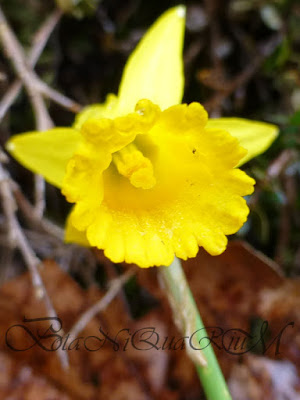NARCISSUS CYCLAMINEUS
AMARYLLIDACEAE
EN: Cyclamen-flowered Daffodil, D: Alpenveilchen-Narzisse, FR: -, ESP: -, ZH: -
EN: Cyclamen-flowered Daffodil, D: Alpenveilchen-Narzisse, FR: -, ESP: -, ZH: -
Description:
Bulbous perennial, vigorous, unusual plant, with narrow, bright green leaves, nodding flowers appear in early spring, bears solitary, vivid golden-yellow flowers that have narrow, completely reflexed perianth segments (like the flower of a cyclamen, hence its name cyclamineus) and slender trumpets, classed in Daffodil flower division 13 which include all natural species. Ideal for container cultivation and rock gardens, will go dormant in summer until the following spring, deciduous.
Height: 15-20c m ( 6-8in)
Maintenance:
Once planted hardly any maintenance required. Leave as natural or remove yellow leaves and spent flowers when going dormant.
Propagation:
Bulbs form offsets that can be easily divided. Best done after flowering and just before it goes dormant in summer.
 |
| A cheerful sight when they come up in spring, Narcissus cyclamineus |
 |
 |
| Inflorescence of Narcissus cyclamineus with completely recurved perianth segments |
Looking into the trumpet |
Meaning of plant name:
NARCISSUS: from greek mythology, a youth who spurned the nymph Echo and fell in love with its own reflection (narcissistic)
CYCLAMINEUS: resembling Cyclamen
 |
| A very sweet combination with Chionodoxa luciliae |
Origin: Portugal, Spain
Growing conditions:
Prefers a sunny, well-drained position but will also grow in partial shade, will not tolerate wet or boggy conditions, waterlogged soil will kill it fairly soon, grows in any pH, alkaline or acid soils, from sand and loam to clay, also chalk, can cope with poorer soils, suitable for growing in containers.
Hardiness: H6 - Hardy in all of UK and northern Europe (-20 to -15°C)
Pests and Diseases:
Foliage might get eaten by slugs, especially if the winter has been mild and molluscs did not get killed off by the frost. Planting on gravel will help.
Other useful information:
not known
 |
| Best planted en masse as they will get lost otherwise. |
 |
| Narcissus cyclamineus on purple slate is a good contrast. |
Have a look at Related Species
